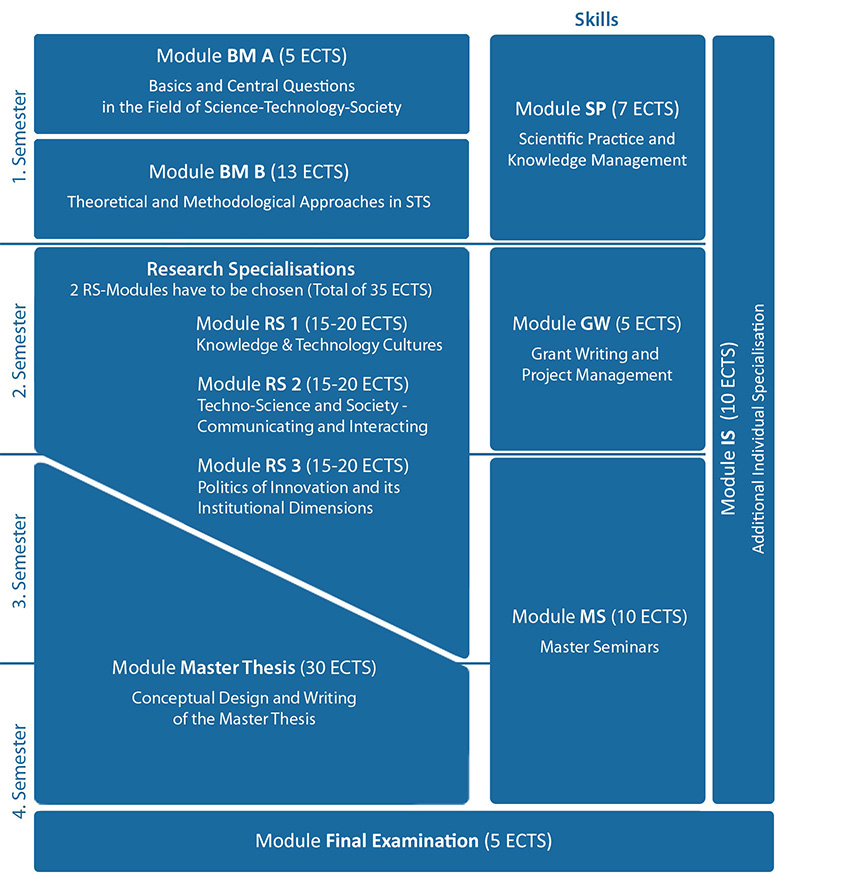Profile & Structure
The MA STS trains students to contribute to a research based critical understanding of the ever more important relations of science, technology and society. Central elements of the programme profile are:
A strong research orientation: courses relate to current research, and students are trained to conduct independent research of their own;
Internationality both in the scope of teaching as well as in the background of the students: a vibrant mix of international students and guest teachers contributes to the unique atmosphere of our programme;
Interactivity between students and teachers: feedback and interaction are central pillars of our learning environment;
A clear social science approach with a dedicated openness to the heterogeneous disciplinary backgrounds of its students: students acquire a solid training in social science theory and methods, but also benefit from the richness of disciplinary backgrounds in the programme;
And a focus on complementary skills vital in today’s academic and knowledge work contexts: ranging from research to grant writing and presentation skills.
Career Perspectives
Students of the MA Science-Technology-Society:
Acquire the sensitivity to recognise the multi-dimensionality of current technoscientific challenges;
Enhance their ability to approach complex problems both systematically and imaginatively;
Gain the expertise to recognise the social and ethical dimensions of science and technology;
Develop their capacity to position themselves in the face of necessarily complex and incomplete information;
Learn to communicate issues related to science, technology and society.
These abilities prepare students for work in a range of different contexts at the interfaces of science, technology and society. The alumni of the programme are well trained to pursue an academic career in the context of PhD programmes in Austria and internationally. They will also find good employment opportunities in science communication, in national and international institutions specialised on funding, governing and managing research and technology, and in companies or NGOs, which need to take decisions related to science, technology and society in rapidly changing contexts.
In this short video, Science Technology Society alumni speak about how they apply their expertise in professional practice. A longer version is available here.
Specialisations
Specialisations
In its respective specialisations, the MA in Science-Technology-Society provides a comprehensive and critical approach to analysing:
- The cultures and contexts in which knowledge and innovations are produced and used:
How knowledge and technologies are produced is strongly shaped by the social constellations in which they are created. These constellations vary across states, institutions and scientific fields. At the same time, our cultures and societies are shaped by new knowledge and technologies; - How (techno)sciences and society communicate and interact:
Understanding science is crucial both for living in the contemporary world and for being an engaged citizen. Communicating science to society and enabling society to interact with science is crucial for contemporary democracies. However, how to do so well is also highly challenging. - How politics frames and is framed by science and technology:
Contemporary politics depends on scientific knowledge and expertise, but it also must face many situations in which action is required but the facts are highly uncertain. Building knowledge institutions able to balance societal values, the call for innovation and the need for democratic accountability is of key contemporary importance.
Programme Structure & Modules
Our master programme is structured in two strands, which correspond with its main didactic aims. The first is devoted to teaching students the basic theoretical and methodological approaches to the interfaces of science, technology and society as well as to guiding them to develop in-depth knowledge on selected research specialisations within this field. In the second strand students are trained in the skills they will need to develop and apply this knowledge in the academic field and beyond.
In the first semester, students learn the basics of STS in working on real world cases. In an award-winning teaching approach, they work in groups and apply the knowledge they acquire to find new research approaches to contemporary problems at the science-society interface. From the second semester, students choose between a wide variety of topical courses, many offered by international guest teachers on their respective research. In the third and fourth semesters, students are supported intensely in writing their thesis.
Please click on the modules for details!

Download
File size: 490 kB
